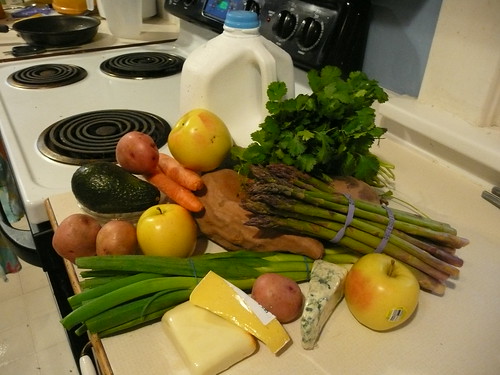1. I eat very little meat. Meat is an expensive protein source compared to beans or soy, and it's much less environmentally friendly. I'm not vegetarian by any means, but cutting down the meat in your diet is good all-around. I bought a big summer sausage at the farmer's market a few weeks ago for $9, made half the sausage into a week's worth of meals, and froze the other half to use later. I cook a meal in which the main element is a piece of meat maybe once or twice a month, and the "meat" in question is usually fish.
2. I try to buy food that is from nearby and in season. Locally grown in-season produce is usually fresher, which means that it's a better deal for your money. And buying out of season is often more expensive because of the energy used to force it to ripen in the wrong climate or to ship it in from somewhere else. (Yes, "normal" factory farmed super-subsidized food from Safeway is usually cheaper overall, but I'm working from a certain baseline assumption of quality and environmental safety. Organic is often best in my book.) Farmer's markets are great for local in season food, but they're not always the most frugal. Compare some prices with a good supermarket's equivalent offerings, and choose the better deal of the two.
3. I rarely go out to eat. Don't get me wrong, I absolutely love trying new restaurants and being inspired by a menu. I'm happy to spend a pretty good chunk of change for a special event at a special place. But I never go to a restaurant for lunch on a weekday, I never buy breakfast on the go, and I happily do not have a $3 a day coffee habit. Instead, I cook big batches of home-made meals, eat leftovers for lunches the following few days, and freeze extras for weeks when I have absolutely no time to cook. A little foresight and two evenings per week cooking can save a ton of time and money.
So with that said, I figured I'd give you a look at my groceries and meal plan for this week. This list assumes I already have a basic stocked kitchen, including oil, flour, spices, grains, dried fruit, and nuts (expensive, but total necessities for me. It helps to buy in bulk.). If I run out of any of these things, then my weekly bill would be a bit higher as I replace them. Overall, I've spent about $50-60 per week on groceries since I've moved to Seattle--not bad!

Groceries bought at Whole Foods this week (everything organic unless stated otherwise):
gallon 1% milk - $5.79
one dozen non-organic free-range no-hormone eggs - $319
2 bunches asparagus, non-organic from Washington - $6.10
2 large sweet potatoes - $6.40
bunch green onions - $1.49
bunch cilantro - $1.25
big box spring mix salad greens - $3.99
avocado - $2.00
2 carrots - $0.67
3 golden apples - $1 (woohoo sale!)
1.27 lbs. red potatoes - $2.53
small chunk bleu cheese, not organic - $2.38
small chunk American meunster cheese, not organic - $1.35
really small chunk amadeus cheese, not organic - $0.85
small amount grey sea salt, not organic - $0.85 (bought in bulk! best deal ever!)
bag refund - negative $0.10
Total cost = $39.73
Cooking for the week:
Vegetarian tacos, roasted carrots and sweet potatoes - dinner Monday, lunch Tuesday and Wednesday
Asparagus potato quiche - dinner Wednesday, lunch Thursday and Friday
Breakfast is cereal, yogurt, toast, or a couple of eggs. Often paired with fruit.
Snacks are fruit, gorp, cheese and crackers.
Occasional dinners are based on scrounging from the fridge; I often end up with a big salad of leftover produce bits.
Other common dinners include soups and stews, vegetable stir fries, casseroles, roasted vegetables over grains, and pastas. All relatively, cheap, healthy, and environmentally friendly. And really the bottom line is that they keep me well fed and happy--isn't that the whole point of good food?
No comments:
Post a Comment